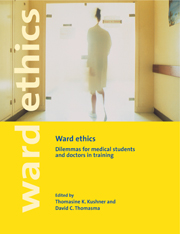Book contents
- Frontmatter
- Contents
- Acknowledgments
- List of contributors
- Prologue. Breaking the silence
- Letter from a young doctor
- Part I On caring for patients
- Section 1 Performing procedures
- 1 The responsibility of informing
- 2 Treating despite discomfort and self-doubt
- 3 Blaming the patient
- 4 Breaking the code: is a promise always a promise?
- 5 The newly dead
- 6 Asking for help: who's listening?
- Section 2 Problems in truth-telling
- Section 3 Setting boundaries
- Part II On becoming a “team player”: searching for esprit de corps and conflicts of socialization
- Section 5 Argot, jargon, and questionable humor: assuming the mantle at the patient's expense
- Section 6 Making waves: questioning authority and the status quo
- Section 7 Perceiving misconduct and whistle-blowing: observing peers or superiors commit an act deemed unethical
- Epilogue: Using this book
- Glossary
- Index
6 - Asking for help: who's listening?
Published online by Cambridge University Press: 05 February 2015
- Frontmatter
- Contents
- Acknowledgments
- List of contributors
- Prologue. Breaking the silence
- Letter from a young doctor
- Part I On caring for patients
- Section 1 Performing procedures
- 1 The responsibility of informing
- 2 Treating despite discomfort and self-doubt
- 3 Blaming the patient
- 4 Breaking the code: is a promise always a promise?
- 5 The newly dead
- 6 Asking for help: who's listening?
- Section 2 Problems in truth-telling
- Section 3 Setting boundaries
- Part II On becoming a “team player”: searching for esprit de corps and conflicts of socialization
- Section 5 Argot, jargon, and questionable humor: assuming the mantle at the patient's expense
- Section 6 Making waves: questioning authority and the status quo
- Section 7 Perceiving misconduct and whistle-blowing: observing peers or superiors commit an act deemed unethical
- Epilogue: Using this book
- Glossary
- Index
Summary
CASE
“I fled from the room”
As a female medical student I was conducting my first physical exam on a male patient, in the presence of classmates and supervising faculty, when it became quite apparent to all that the patient had an erection. I was taken by surprise, flustered and embarrassed, and not knowing how to deal with the situation, I fled from the room. Later, my male colleagues couldn't understand my response. I know my unprofessional behavior added to the discomfort of the patient, a young man not very much older than myself. For that I am profoundly sorry. I was not prepared for such a situation and still have received no instruction as to how best to manage a similar future occurrence – for the patient's sake as well as my own.
CASE
“I still don't know what I did wrong”
I was a third year medical student when one of our patients needed to have a nasogastric tube put in. The team turned to me and told me to see to it that this was done – and then they all disappeared. Before, in similar situations, a resident would say “Let's get the stuff and do it” but this time I found myself entirely alone. A day or two earlier, a resident had showed me the procedure; so, I went to find him. However, this time he just said “I've already shown you how to do that, just get it down. Call me if you have any problems.”
- Type
- Chapter
- Information
- Ward EthicsDilemmas for Medical Students and Doctors in Training, pp. 66 - 78Publisher: Cambridge University PressPrint publication year: 2001
- 1
- Cited by



